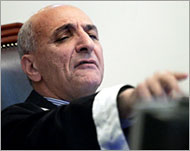Saddam admits ordering Dujail trials
Former Iraqi leader Saddam Hussein has admitted that he ordered the trial of those suspected of involvement in an assassination attempt on him in the town of Dujail.

Insisting that he had also ordered the confiscation of their lands, Saddam on Wednesday told the court that doing so was not a crime.
Speaking at his trial in Baghdad, he told judges that his seven co-defendents in the trial should be freed and he alone should be tried
“Where is the crime?” Saddam asked the court. “Is referring a defendant who opened fire at a head of state, no matter what his name is, a crime?”
Saddam and seven co-defendants are on trial for the torture, illegal imprisonment and executions of 148 Shia, as well as the arrest and torture of others and the confiscation and razing of their farmlands.
The prosecution says the move was a reprisal by the then Iraqi leader, following a 8 July, 1982 attempt to assassinate him in the town of Dujail.
In a 15-minute speech at the end of a day of hearings, Saddam said that he alone as head of state should be held accountable for the charges.
 |
|
Judge Abd al-Rahman has |
“If there is a law issued by Revolutionary Command Council that calls for confiscating land, then try the chairman of the Revolutionary Command Council. He is present,” said Saddam who was the head of the council, a main institution of his government.
The judge then adjourned the trial until 12 March.
Earlier in the day Saddam and his co-defendants tried to dispute documents put forward by prosecutors detailing the wave of imprisonments and executions that followed the 1982 assassination attempt.
A series of documents presented by the chief prosecutor outlined the bureaucracy behind a crackdown that led to the imprisonment of nearly 400 people, including women and children as young as three months old.
Decree
On Tuesday, the prosecution presented a presidential decree with a signature it said was Saddam’s approving death sentences against 148 of the prisoners.
In contrast to the outbursts, insults and arguments that have characterised past proceedings, the defendants listened silently as the documents were shown.
The turn in the tone of the case boosted hopes that the controversial trial would be seen as credible in a country still sharply divided by Saddam’s legacy.
However, those splits have only become wider amid a surge of bloody sectarian violence between Iraq‘s Sunnis and Shias.
|
“Is referring a defendant who opened fire at a head of state, no matter what his name is, a crime?” |
At least 68 people were killed on Tuesday in bombings and mortar barrages, mainly against religious targets, in continued violence sparked by an attack last week on a major Shia shrine.
In the first months of the trial, a series of Dujail residents testified that they were imprisoned and tortured and that their relatives were killed.
Several women related how they were stripped naked, beaten or given electric shocks.
The prosecution documents aim to establish a paper trial linking the defendants to the crackdown.
Some documents indicated that about 50 of those sentenced to be executed had actually died during interrogation before they could go to the gallows.
On Wednesday, Jaafar al-Mussawi, the chief prosecutor, showed handwritten letters said to be from three of the defendants sent to the Interior Ministry in the days after the 8 July 1982 assassination attempt on Saddam.
The letters were informing on Dujail families linked to the Dawa Party, a Shia opposition militia accused in the attack.
More than 10 of the names in the letters eventually appeared on the list of those sentenced to death in 1984 by the Saddam regime’s Revolutionary Court.